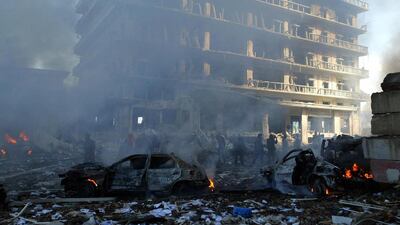As the head of Lebanon's General Security branch, Jamil Al Sayyed became a key player in one of the country's most harrowing post-war periods.
His journey has revolved around his role – alleged and refuted – in the assassination of prime minister Rafik Hariri on February 14, 2005.
Within three months Mr Al Sayyed had quit his post. By August, that same year, he was in custody, accused of helping plot the huge car bomb that hit Mr Hariri's motorcade in downtown Beirut killing 22.
Mr Al Sayyed would spend four years behind bars, before being released on account of recanted testimony. Last month, in what seems the most remarkable of comebacks, he became a member of parliament.
__________
Read more:
Lebanon’s ex-security head testifies in killing he was accused of
__________
Last week he took another step toward what might be considered his rehabilitation from the bloodshed of 2005, appearing as a witness at The Hague as part of the independent international investigation into Mr Hariri's killing.
From one of the country’s most powerful men to a prison cell and now to parliament, Mr Al Sayyed exemplifies the country’s political shifts over the past 13 years. For many, he also stands as a warning about its future.
Mr Hariri's murder sparked a wave of demonstrations that became known as the Cedar Revolution. It galvanised a local and international movement that led to pressure that culminated in the Syrian regime's withdrawal from the country after nearly three decades of occupation and saw over a million people, almost a quarter of the population, take to the streets to demand a Syrian exit.
The years after Mr Hariri’s death were bloody.
Numerous anti-Syrian public figures, journalist and politicians were assassinated, including writer and editor Samir Kassir and former finance minister Mohamad Chatah, as well as a number of security officials connected with the UN's special tribunal for Lebanon, known as the STL investigation.
Wissam Eid, an officer in the separate and in some senses rival security branch of the Internal Security Forces, was credited with uncovering the telecoms data that has become central to the STL prosecution’s case. He was assassinated in 2008, Then in 2012, the ISF Intelligence Branch head Wissam al-Hassan was also killed. A close security adviser to Mr Hariri, Mr Al Hassan was reportedly meant to travel with the former prime minister on the day he was killed.
Standoffs and political battles between Saad Hariri, Mr Hariri’s son who took over as head of the Future Movement and has served as prime minister, and Hezbollah spilt out onto the streets – most notably in 2008 when Hezbollah gunmen took over central Beirut.
Speaker of Parliament Nabih Berri mediated numerous national dialogue sessions to give a platform to diffuse tensions. Notably, Hezbollah leader Hassan Nasrallah – almost never seen in public in recent years – would regularly attend. Political deadlocks led to long periods without a government and then after the start of the Syrian conflict in 2011, spill over and insecurity saw dozens of bombings across the country and then ISIS and Jabhat Fateh al-Sham militants briefly overrun the country’s northeastern town of Arsal in 2014.
But today, Lebanon’s political situation couldn’t be more different. Security stability has returned - largely due to Hezbollah securing the Syrian side of the Lebanese border and the international community’s millions of dollars in defence training and equipment for the Lebanese Army.
After Michel Aoun was elected president in October 2016 – ending a 29-month vacancy in the country’s top post – politicians swiftly formed a cabinet, parliament passed the first national budgets in a decade followed by a second a year later. Then came the three-time delayed parliamentary elections, the first in nine years. Political parties have been focusing on economic and legal reforms in a period of national consensus in which old rivals have largely worked together, including Mr Hariri and Hezbollah.
While the STL has been a long process in which many in Lebanon have lost interest, experts on the trial have suggested one of the essential by-products has been that that allowed Saad Hariri to outsource the investigation to a third party while continue working with all parties in Lebanon – including Hezbollah – without the death of his father impacting his relations.
However, the old issues – such as Syria’s role in the country - are never far away.
Seen by many as one of the most prominent faces of Syria’s tutelage of the country, Mr Al-Sayyed's entry to parliament on Hezbollah's electoral list was met with concern by many that Damascus was seeking new inroads into Lebanon as their own civil war appears to wind down.


